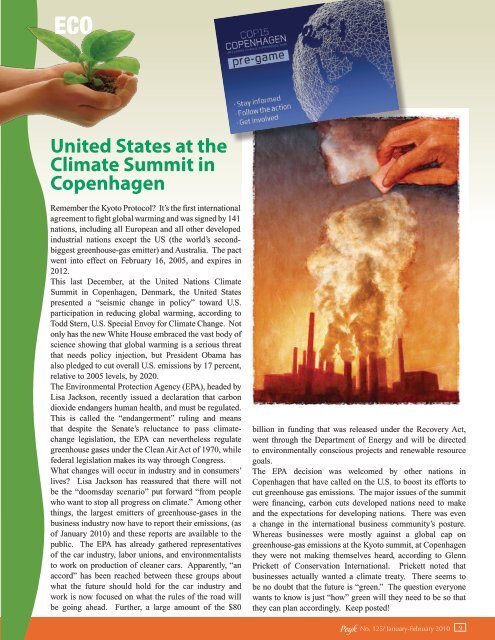English Section - Persian Cultural Center
English Section - Persian Cultural Center
English Section - Persian Cultural Center
You also want an ePaper? Increase the reach of your titles
YUMPU automatically turns print PDFs into web optimized ePapers that Google loves.
ECO<br />
United States at the<br />
Climate Summit in<br />
Copenhagen<br />
Remember the Kyoto Protocol? It’s the first international<br />
agreement to fight global warming and was signed by 141<br />
nations, including all European and all other developed<br />
industrial nations except the US (the world’s secondbiggest<br />
greenhouse-gas emitter) and Australia. The pact<br />
went into effect on February 16, 2005, and expires in<br />
2012.<br />
This last December, at the United Nations Climate<br />
Summit in Copenhagen, Denmark, the United States<br />
presented a “seismic change in policy” toward U.S.<br />
participation in reducing global warming, according to<br />
Todd Stern, U.S. Special Envoy for Climate Change. Not<br />
only has the new White House embraced the vast body of<br />
science showing that global warming is a serious threat<br />
that needs policy injection, but President Obama has<br />
also pledged to cut overall U.S. emissions by 17 percent,<br />
relative to 2005 levels, by 2020.<br />
The Environmental Protection Agency (EPA), headed by<br />
Lisa Jackson, recently issued a declaration that carbon<br />
dioxide endangers human health, and must be regulated.<br />
This is called the “endangerment” ruling and means<br />
that despite the Senate’s reluctance to pass climatechange<br />
legislation, the EPA can nevertheless regulate<br />
greenhouse gases under the Clean Air Act of 1970, while<br />
federal legislation makes its way through Congress.<br />
What changes will occur in industry and in consumers’<br />
lives? Lisa Jackson has reassured that there will not<br />
be the “doomsday scenario” put forward “from people<br />
who want to stop all progress on climate.” Among other<br />
things, the largest emitters of greenhouse-gases in the<br />
business industry now have to report their emissions, (as<br />
of January 2010) and these reports are available to the<br />
public. The EPA has already gathered representatives<br />
of the car industry, labor unions, and environmentalists<br />
to work on production of cleaner cars. Apparently, “an<br />
accord” has been reached between these groups about<br />
what the future should hold for the car industry and<br />
work is now focused on what the rules of the road will<br />
be going ahead. Further, a large amount of the $80<br />
billion in funding that was released under the Recovery Act,<br />
went through the Department of Energy and will be directed<br />
to environmentally conscious projects and renewable resource<br />
goals.<br />
The EPA decision was welcomed by other nations in<br />
Copenhagen that have called on the U.S. to boost its efforts to<br />
cut greenhouse gas emissions. The major issues of the summit<br />
were financing, carbon cuts developed nations need to make<br />
and the expectations for developing nations. There was even<br />
a change in the international business community’s posture.<br />
Whereas businesses were mostly against a global cap on<br />
greenhouse-gas emissions at the Kyoto summit, at Copenhagen<br />
they were not making themselves heard, according to Glenn<br />
Prickett of Conservation International. Prickett noted that<br />
businesses actually wanted a climate treaty. There seems to<br />
be no doubt that the future is “green.” The question everyone<br />
wants to know is just “how” green will they need to be so that<br />
they can plan accordingly. Keep posted!<br />
No. 125/ January-February 2010 9

















